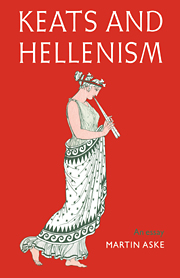Summary
Much of Keats's early poetry, from the verse epistles to Endymion, is motivated by a desire to experience the plenitude of beginnings, that privileged moment which marks the origin of a specific poem and, by implication, the originality of poetic consciousness. As Edward Said observes, the demand for a locatable beginning might be a ‘necessary fiction’, particularly for the act of writing. Aware of himself as a modern poet who would have to write against the whole weight of literary history, Keats faced a problem which Said defines thus : ‘Other writing serves to displace present writing, to a greater or lesser extent, from its absolute, central, proper place.’ The powerful authority of the ancient fictions, enshrined in the texts of Homer and Spenser and Milton, would engender an imaginative need for a new beginning, where the modern poet might assert his originality by departing from the great models of the past. And yet it is the very ability to ‘depart’ which becomes problematic; Keats might find that he cannot so easily close the supreme Text of Antiquity, for fear of severing himself from the richest origins of poetic consciousness. ‘To begin is always uncertain, nextdoor to chaos’, writes Angus Fletcher : ‘To begin requires that, uncertainly, we bid farewell to some thing, some one, some where, some time.’ It did not take long, of course, for Keats to recognize the poignant relation between beginnings and valediction, between writing and loss.
- Type
- Chapter
- Information
- Keats and HellenismAn Essay, pp. 38 - 52Publisher: Cambridge University PressPrint publication year: 1985

